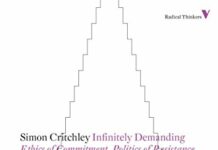
Ebook Info
- Published: 2020
- Number of pages: 167 pages
- Format: PDF
- File Size: 5.21 MB
- Authors: Simon Critchley
Description
On Heidegger’s Being and Time is an outstanding exploration of Heidegger’s most important work by two major philosophers. Simon Critchley argues that we must see Being and Time as a radicalization of Husserl’s phenomenology, particularly his theories of intentionality, categorial intuition, and the phenomenological concept of the a priori. This leads to a reappraisal and defense of Heidegger’s conception of phenomenology. In contrast, Reiner Schürmann urges us to read Heidegger ‘backward’, arguing that his later work is the key to unravelling Being and Time. Through a close reading of Being and Time Schürmann demonstrates that this work is ultimately aporetic because the notion of Being elaborated in his later work is already at play within it. This is the first time that Schürmann’s renowned lectures on Heidegger have been published.The book concludes with Critchley’s reinterpretation of the importance of authenticity in Being and Time. Arguing for what he calls an ‘originary inauthenticity’, Critchley proposes a relational understanding of the key concepts of the second part of Being and Time: death, conscience and temporality.
User’s Reviews
Reviews from Amazon users which were colected at the time this book was published on the website:
⭐I am a little annoyed with amazon. I just finished reading this book only to discover that the last three pages are missing. So I have not actually read this entire book but I am going to review it anyway! I am not recommending that anyone who is interested in Heidegger avoid purchasing this book (it is a very good book and I am sure most of the copies are complete) but if you do buy this book I would recommend taking a gander at Simon Critchley’s final essay and making sure it goes all the way to page 152 before you read the whole book and fill it up with notations as I have done. It is possible the pages fell out after I bought it since a few more pages fell out while I was in the process of writing this review. While the content of this book is excellent the binding certainly leaves something to be desired!The book is really excellent and provides two different perspectives on Heidegger from two top-notch scholars. Simon Critchley has two essays in the book. In the first essay Critchley reads Being and Time in light of Heidegger’s lectures on the History of the Concept of Time in which Heidegger outlines his debt to Husserlian phenomenology. Heidegger in particular takes up the notion of categorial intuition and applies it to our understanding of Being, that is, “being is an aspect of phenomenological seeing, in some sense a matter of phenomenological intuition” for Heidegger, “against the modern philosophical self-understanding, phenomenology grants to being a new sense of non- or, better, trans-subjective givenness” (10). Being is not an ontic property of objects (we cannot point to the being of the chair in the same way we can point to its legs or its brownness) but being, in the form of the copula, articulates our experience and “the notion of categorial intuition is the thought that the being of things, that in virtue of which things are intelligible or understandable, their substance, quality or whatever, is something intuited, sighted or seen in those things; it is something intentionally given” (19). This is an extremely important point in terms of understanding Heidegger’s philosophy as a whole. Dasein does not just relate to beings, it goes beyond beings and understands the Being of beings, but the Being of beings is given (which is why the ready-to-hand, or Zuhanden, is a determination of the Being of beings and is not a subjective projection). The fact that Dasein understands beings in their Being is why fundamental ontology must pass through the regional ontology of Dasein. For anyone who is interested in reading more about the Husserlian influence on Heidegger, as well as the ways in which Heidegger deviated from his Husserlian legacy, I highly recommend taking a look at
⭐by Jacques Taminiaux. Critchley draws directly on Taminiaux in his own analysis.The second essay by Critchley is a critique of the notion of authenticity in an attempt to respond to the “urgent task of Heidegger interpretation,” which is, “to try to defuse the systematic link between Heidegger’s philosophy and his politics” (141). Critchley sees this systematic link in Heidegger’s understanding of authenticity, historicity, and being-with. Any authentic understanding of history lies in Dasein’s “self-understanding of being human, i.e. finitude” (139) which means being-towards-death. It is also a fact that Dasein is always already Mitsein (being-with) so if, “authentic Dasein is always already Mitsein, then such historicizing has to be what Heidegger calls co-historicizing. An authentic individual life, Heidegger would seem to be suggesting, cannot be lead in isolation and opposition to the shared life of the community” (140). It is true that our inauthentic mode of being-with is based in the They but authentic being-with, and authentic historicizing, Heidegger determines as destiny, “the authentic communal mode of Mitsein that masters the inauthenticity of das Man is das Volk, the people” (140). This is precisely where, in Critchley’s opinion, Heidegger’s thought falls into the trap of Nazism. I think there is a lot that could be done in this area in terms of pointing out the short-comings in Heidegger’s analyses of being-with, authenticity, historicity, destiny, and the life of the community, etc.. It is clear, in my opinion, that Heidegger made an error here and probably more than one. Simon Critchley points out a number of errors. Critchley argues that Heidegger’s interpretation of our understanding of death as non-relational is mistaken, that Heidegger’s analysis of being-with ignores the face-to-face ethical relation, that Heidegger’s analysis of time misses the way in which we are always too late to grasp the present heroically, and that Heidegger’s analysis of conscience misses the way in which the conscience is an interior mark left by our relations with the other (the influence of Levinas on Critchley’s criticisms of Heidegger should be obvious to anyone at all familiar with Levinas’ work). All of these are, I think, valid criticisms but I still think a lot more could be done in this area in terms of searching out the sources of Heidegger’s decision to throw in with the Nazis and critiquing those sources.Reiner Schurmann takes a very different approach in his commentary on Being and Time then Simon Critchley. Part of what makes this such a valuable volume is getting the two different perspectives. While Critchley reads Heidegger, at least in his first essay, primarily in terms of his influences Schurmann reads Being and Time in the light of Heidegger’s later philosophy. Schurmann lays stress, therefore, on the event character of Dasein, or “the event by which Dasein opens a world” (71). One can already see in Being and Time the primacy of this event of truth (Ereignis in Heidegger’s later formulation) in relation to any attempt at scientific metaphysics. The event character, “is the trait that shows most clearly the difference between metaphysical ontologies (which found the sciences) and phenomenological ontology (which is said to be the foundation of metaphysical ontologies). The step from metaphysical ontologies to fundamental ontology is of a different kind from the step from the sciences to metaphysical ontologies” (71). This is the move, in the later Heidegger, from metaphysics to being-historical-thinking. Schurmann also locates the source of Heidegger’s later understanding of calculative thinking in inauthentic totalization and the source of Heidegger’s later understanding of genuine thinking in authentic totalization, “calculative totalization prefigures, ‘calculative thinking’, and existential totalization prefigures ‘letting-be, releasement, and eventually Ereignis'” (116). In inauthentic totalization “Dasein is a whole by summation, summarizing objectively given experiences” (112). In authentic totalization, “Dasein does not affix itself to one or another particular possibility. Rather, all its concrete possibiities are unified out of Being-towards-death, out of the future” (113). These are just a few examples of the way in which Schurmann connects Being and Time to the later Heidegger. Schurmann also has a number of helpful diagrams and charts diagramming various aspects of Being and Time. For anyone who reads and enjoys Schurmann’s account of Being and Time in this work I would highly recommend his book
⭐. I have actually just started it, and am not very far yet at all, but it is so good that I feel confident in recommending it despite not having read much of it. Schurmann also wrote another book on Heidegger I have not read but is supposed to be very good:
⭐. Despite not having read it I feel certain, after reading his lengthy essay in this work and the first sections of Broken Hegemonies, that it is excellent as well.All in all I would say this is an indispensable companion to Being and Time despite its rather shoddy binding.
⭐This book is a great study tool. Critchley does a wonderful job illustrating the history of Heidegger’s early thought. He takes Being and Time as a new development of the phenomenological tradition and thus gives the Husserlian origins as well as Heidegger’s own early lectures on this movement in philosophy. It is an existite overview for people approaching Heidegger without any background in turn of the 20th century German thought.Schurmann’s notes seem to be a little more like graduate student’s class notes. Beneficial for some, but nothing stellar.Critchley’s essay on Authenticity is also very interesting and worth the price of the book.
⭐Great intro to Heidegger. I’d recommend to read it before reading Being and Time.
Keywords
Free Download On Heidegger’s Being and Time 1st Edition in PDF format
On Heidegger’s Being and Time 1st Edition PDF Free Download
Download On Heidegger’s Being and Time 1st Edition 2020 PDF Free
On Heidegger’s Being and Time 1st Edition 2020 PDF Free Download
Download On Heidegger’s Being and Time 1st Edition PDF
Free Download Ebook On Heidegger’s Being and Time 1st Edition





